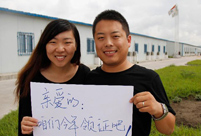 Turnip sculptures amaze tourists in Qingdao
Turnip sculptures amaze tourists in Qingdao Chinese ship formation conducts live fire training in West Pacific
Chinese ship formation conducts live fire training in West Pacific
 China comes in third at figure skating team event
China comes in third at figure skating team event
 China's teenager skater Yan shines at his Olympic debut
China's teenager skater Yan shines at his Olympic debut
 Taiwan-born actor stars on US TV series
Taiwan-born actor stars on US TV series
 Chinese Lunar New Year gift from abroad
Chinese Lunar New Year gift from abroad Chinese champions of Winter Olympic Games
Chinese champions of Winter Olympic Games  Zhang Yimou fined 7.48 mln for over-production
Zhang Yimou fined 7.48 mln for over-production
 Top 10 timeless female Chinese stars
Top 10 timeless female Chinese stars
How would the international community have reacted if post-war German leaders denied the validity of the Nuremberg Trials and paid respects to Adolf Hitler? Certainly, with outrage and disgust.
The Potsdam Declaration is explicit on the territory of post-war Japan. Article 8 of the declaration stipulates that the "terms of the Cairo Declaration shall be carried out and Japanese sovereignty shall be limited to the islands of Honshu, Hokkaido, Kyushu, Shikoku and such minor islands as we determine". The Cairo Declaration, issued jointly by the US, Great Britain and China on Dec 1, 1943, says: "Japan shall restore all the territories it has stolen from China, such as Manchuria, Taiwan and Peng-hu islands, to China." The Diaoyu Islands, which Japan has been claiming as its territory, was then a part of Taiwan, which is an integral part of China.
In the 1972 Sino-Japanese Joint Statement, China reiterated its stance that Taiwan is an inalienable part of its territory, and Japan said it fully understood the Chinese government's stance and would comply with Article 8 of the Potsdam Declaration.
In October 1972, Ohira Masayoshi, then Japanese foreign minister and prime minister from 1978 to 1980, told his country's parliament that Japan, bound by the Cairo Declaration and Potsdam Declaration, should return the Diaoyu Islands to China, which he emphasized should be an unchangeable position of the Japanese government.
Article 98 of Japan's Constitution says the Constitution is the supreme national law and any laws, orders, mandates and related government actions that contravene it will be invalid. It also says that Japan will abide by all the treaties it has signed as well as all the established international laws and regulations. Therefore, according to both international and domestic laws, Japan must return the Diaoyu Islands to China, and all its domestic policies and measures that violate its Constitution should be regarded as null and void.
After the Sino-Japanese War of 1894-95, Japan forced the Qing Dynasty (1644-1911) government to sign the unequal Treaty of Shimonoseki, under which it annexed Taiwan and its affiliated islands. After World War II, Japan regained its control over the islands by taking advantage of the separatist elements across the Taiwan Straits and the US' trusteeship of the Ryukyu Islands, which has been strongly opposed by China. However, China and Japan decided to shelve the Diaoyu Islands dispute in the 1970s in their effort to normalize bilateral relations and sign a friendship treaty.
Today, the Japanese government recognizes neither the territorial dispute nor the agreement it once reached with China to "shelve the dispute" over the Diaoyu Islands, and thus refuses to hold dialogue with China on the issue.
Former prime minister Yoshihiko Noda's government intensified tensions between China and Japan by "nationalizing" some of the Diaoyu Islands. Now, the Abe government is strengthening its defense forces and trying to drag the US into its confrontation with China.
To put paid to Abe's evil designs, the international community should compel Japan to continue complying with the post-war international order established by the Cairo Declaration and Potsdam Declaration.
The author is deputy director of the Institute of Modern International Relations, Tsinghua University.

 Special Coverage: Sochi Winter Olympic Games
Special Coverage: Sochi Winter Olympic Games  A day of a female high-speed train chief attendant
A day of a female high-speed train chief attendant New Year greetings from Chinese nationals in Africa
New Year greetings from Chinese nationals in Africa PLA navy conducts landing drills in South China Sea
PLA navy conducts landing drills in South China Sea  Blind date fair in Hangzhou
Blind date fair in Hangzhou  Highlights of Chinese New Year celebrations around the world
Highlights of Chinese New Year celebrations around the world  How do the Chinese spend their money during Spring Festival?
How do the Chinese spend their money during Spring Festival? 'Milk Tea' girl hosts Spring Festival gala of universities in U.S.
'Milk Tea' girl hosts Spring Festival gala of universities in U.S.  Brave mother fights cancer, enjoys Spring Festival with her triplets
Brave mother fights cancer, enjoys Spring Festival with her triplets President Xi attends opening ceremony of Sochi Winter Olympics
President Xi attends opening ceremony of Sochi Winter Olympics Highlights of opening ceremony of Sochi Winter Olympic Games
Highlights of opening ceremony of Sochi Winter Olympic Games Snowscape in Chinese New Year
Snowscape in Chinese New Year Interesting horse figures in life
Interesting horse figures in life  Top 20 most beautiful Chinese stars
Top 20 most beautiful Chinese stars  Top 10 Chinese films in 2013
Top 10 Chinese films in 2013Day|Week|Month